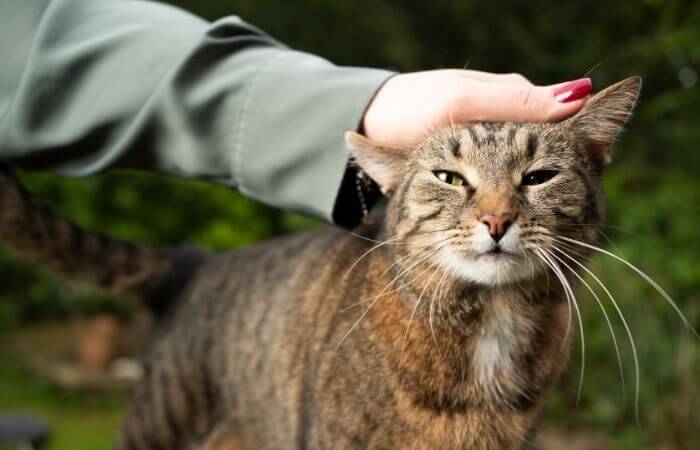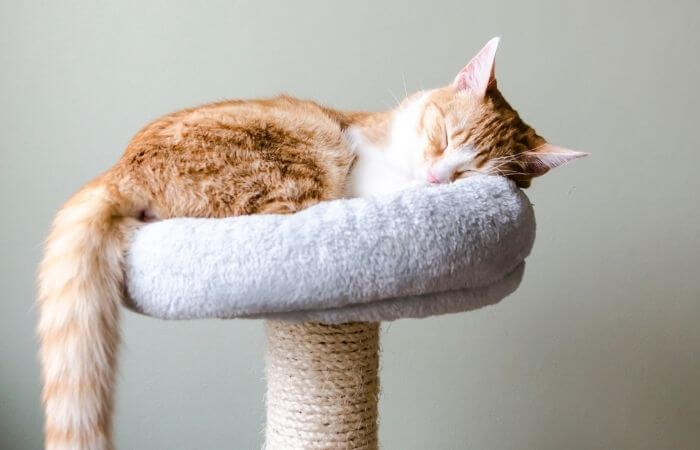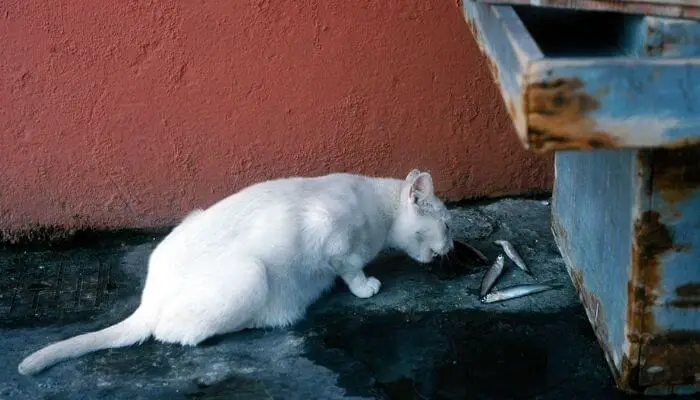Like humans, cats can be affected by changes in their lives and need to be calmed down sometimes.
Our feline friends might seem cool, calm and collected, but they can easily become stressed or scared.
Common triggers are a new person in the house, a change to their surroundings, a trip to the vets or moving to a new house.
And, as anyone who has a cat will tell you, they are fiercely independent creatures.
This means it can be hard to calm down a stressed-out kitty. But not impossible.
Let’s find out more about how to spot when a cat is anxious or stressed and how to calm him or her down.
Contents
How To Spot A Stressed-out Cat
Usually, when a person is stressed out you can spot it in their behaviour and body language.
They might touch their face and grasp at their hair.
Their eyes might widen and their forehead might crease with frustration.
A cat is no different and will show physical signs of stress, such as:
- Tense muscles
- Sitting in a crouched position
- Tail tucked into the body
- Head lowered
- Ears pointing sideways
- Dilated pupils
- Eating or drinking less
- Vomiting
- Avoiding the litter tray
Some cats even go into hiding when they’re anxious.
For example, if your cat hides in a wardrobe or a cupboard when you have visitors at the house, it’s probably unsettled by the new people.
But how can you calm a cat?
When a cat is stressed, it will need space, not contact.
This means don’t try to pick the cat up, which might cause even more stress.
Remember, cats are independent creatures, even when anxious.

It also helps to understand why cats act the way they do.
So, let’s take a closer look at the mentality of a cat and a few tips on how to create a peaceful environment for your pet.
Understand The Cat Mentality
Change is a big trigger for stress in cats. They like their routines and their environment to be familiar.
In a nutshell, they’re sensitive and any long-term changes should be introduced gradually to give the cat time to adjust.
A prime example is moving to a new house, which can be very stressful for a cat.
But cat behavioural experts say the pressure can be eased by using the sense of smell.
You can do this by placing a piece of your unwashed clothing in the travel case or sleeping basket at the new home so there is something familiar.
This should help to calm the cat.
Another thing to remember is that cats rub their face on furniture and places so that it smells like them.
It’s a way to mark their territory.
If you’re moving house or bringing in new pieces of furniture, rub their face with a cloth and then wipe it on the furniture.
This way, it will seem more familiar to your cat and cause less stress.
The key to making any changes though is slow and steady.
Go too fast and your cat could end up shocked and scared.
Create A Special Cat Area
Cats like to be warm and cosy in a place where they feel safe.

And they like to have an area just for them, as long as they’re not trapped.
This is why creating a special place for your cat could become a sanctuary in times of stress.
But where is the best place to create a special cat area?
It will depend on the cat. Some cats like to hide underneath things.
And other cats like to climb up high, finding safety in height.
If your cat likes to hide, find a cosy corner that can become the cats own space.
If your cat likes to climb, then think about getting an elevated cat bed or climbing tree.
You might even want to invest in both if you have a particularly sensitive cat.
Also Read: How To Make A Cat Sleep Instantly
Use Essential Oils And Music
The sense of smell is really important for a cat and they respond strongly to particular scents.
If you have a stressed out cat, try using a cat safe essential oil to calm it down.
You can do this by placing a few drops in a room where the cat spends a lot of time.
Some essential oils have very calming scents and can be used by vets to calm aggressive cats, valerian is one example.
Cats can also be very affected by sound.
Loud noise can really unsettle a cat. But soft, gentle music or white noise can be soothing to your feline friend.
Especially if your cat is left alone indoors for long periods of time.
In fact, researchers have even found that cats respond well to “species-specific” music.
This means music that has a similar frequency and tempo to their natural communication.
Think sounds similar to purring and elements of nature.
So, if your cat is anxious, try playing relaxing music and use cat safe essential oils to see if it helps to calm it down.
A Happy Cat Is A Healthy Cat
Any pet owner will know how important it is for an animal to be happy and healthy. Well-being isn’t just for humans.
Pets experience emotions too and can be unbalanced by changes to routines or their environment.
Cats, in particular, are sensitive animals.
They like their environment to be familiar, warm and cosy.
They like to be left alone to live an independent life, but also to be comforted and stroked when they want it.
And they can be demanding and dismissive in equal measures.
For most cat owners, they wouldn’t have it any other way.
But if your cat is showing signs of anxiety then it could be worth trying some of the methods above.
While also trying to identify the cause of the stress.
Also Read: 6 Ways To Calm A Cat In A Car
As an Amazon Associate I may earn a small fee from qualifying purchases at no extra cost to you. This helps us run the site, so thanks for your support!






Leave a Comment